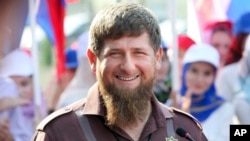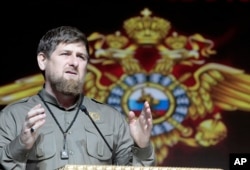A leading international human rights group released a report this week detailing what it says is an intensifying crackdown on dissent in Chechnya, the republic in Russia's North Caucasus region ruled with an iron fist by Ramzan Kadyrov, its Kremlin-appointed leader.
The 56-page report by New York-based Human Rights Watch (HRW), titled “Like Walking a Minefield: Vicious Crackdown on Critics in Russia’s Chechen Republic," describes “how local authorities punish and humiliate people who show dissatisfaction with or seem reluctant to applaud the Chechen leadership and its policies,” and the “increasing threats, assaults and detention of journalists and human rights defenders,” HRW said in a press release Thursday.
On September 18, Kadyrov, whom the Kremlin has appointed and re-appointed to lead the republic, will participate in direct elections for the top post for the first time.
“The increasingly abusive crackdown seems designed to remind the Chechen public of Kadyrov’s total control,” the report states, and to prevent “any negative information from Chechnya that could undermine the Kremlin’s support for Kadyrov.”
HRW's report is based on more than 40 interviews, with victims of abuses in Chechnya as well as human rights defenders, journalists, lawyers and other experts.
It cites the case of Khizir Ezhiev, an economics professor at Grozny State Oil Technical University, who was abducted by unidentified gunmen last December after making derogatory comments about Kadyrov during a closed discussion on a Russian social media site. On New Year’s Day, Ezhiev’s body was discovered with multiple fractures in a forest approximately 40 kilometers from the Chechen capital, Grozny.
The report on Chechnya was prepared by Tanya Lokshina, HRW's Russia program director and Moscow-based senior researcher. She told VOA’s Russian service that the scale of the repression perpetrated by Chechen authorities against the republic’s inhabitants is striking.
"It is important to emphasize that over the past six years, the level of repression against even the mildest critics of the situation in Chechnya has gone flat-out off the charts,” she said. “We all understand that Kadyrov is very dependent on the Kremlin politically and financially. And, apparently nervous – knowing that there is a certain degree of dissatisfaction on the part of the Kremlin leadership – Kadyrov has tried to purge the information space completely, apparently assuming that if no negative information spills out of Chechnya, the problem will be solved. No information – no cause for dissatisfaction.”
According to Lokshina, the federal authorities have expressed some dissatisfaction with Kadyrov over the last half-year.
"This must not be underestimated," she said, "because it was the first time that it happened in Kadyrov’s political career."
Lokshina, who has frequently visited Chechnya, said that persecution for the slightest criticism of its leadership has created an unbearable atmosphere for many people in the republic – an atmosphere even worse than during the republic’s two wars against the Russian military, in which tens of thousands of people were killed.
“I was strongly driven to start work on this report by the fact that over the past year, I have increasingly heard from people from Chechnya the same opinion, expressed in different words: ‘The war was horrible – the bombing, shelling, abductions and disappearances, the dreadful federal operations – but we somehow survived this nightmare without losing our dignity. But now the fear is so suffocating that we can do nothing; our dignity has been taken away. And the fact that we have been robbed of our dignity is even worse than war.'”
The chairman of the board of the Memorial Human Rights Center, Alexander Cherkasov, told VOA’s Russian service that people are persecuted in Chechnya not only for political dissent.
“We, Memorial, also released, in June, a report analyzing the situation in the North Caucasus over the last two [or] three years,” he said, noting that the report included cases in which residents of Chechnya complained directly to Kadyrov, often via social media, about such problems as corruption on the part of local officials.
"There were stories about extortion, … about kickbacks demanded in return for the reconstruction of housing," Cherkasov said. "And after these stories were told, those who recounted them found themselves in less than comfortable circumstances, to put it mildly. They were subsequently shown on television expressing contrition which was, to say the least, not really voluntary – they took back their words and declared their love for the head of the Chechen Republic.”
According to Cherkasov, the violations of political rights in Chechnya detailed in HRW’s report and violations of socioeconomic rights are inextricably linked.
“People in Russia often say that civil rights are not so important, that economic and social rights are more important, and that we can somehow get by without civil rights. However, experience – both in Russia generally and Chechnya in particular – says otherwise."





